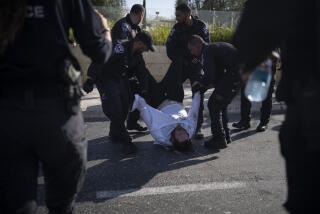Many Israelis Aghast as Critic Is Chosen for Prize
- Share via
JERUSALEM — The nomination of an iconoclastic philosopher to receive Israel’s most prestigious award erupted in controversy Sunday as rightist politicians condemned it and Prime Minister Yitzhak Rabin asked publicly whether the government had to honor one of its sharpest critics.
Awarding professor Yeshayahu Leibowitz, 90, the Israel Prize “fills me with disgust,” said former Prime Minister Yitzhak Shamir. And another leader of the opposition Likud Party said the award should now be renamed the “Hatred of Israel Prize.”
Rabin, angered by Leibowitz’s calls upon young Israelis to refuse to serve in the army on the occupied West Bank and Gaza Strip, directed Education Minister Shulamit Aloni to see if the government could reject or ignore the nomination. But Aloni endorsed the prize committee’s recommendation.
The controversy has renewed and sharpened, quite publicly and painfully, Israelis’ never-ending debate over what kind of nation, what kind of state and what kind of society they should create, and in that context the controversy recalled the historic role played by Israel’s biblical prophets.
“This is the uniqueness of Israel--giving our most prestigious prize to a person who criticizes the policies of the government,” Police Minister Moshe Shahal said after the Cabinet unexpectedly found itself debating the Leibowitz nomination at its weekly meeting.
“It is a special way of telling the whole world that we are one of the most open and democratic societies. I favor the award although I oppose the ideas of Professor Leibowitz.”
In nominating Leibowitz for a prize intended to recognize Israel’s best minds and deepest souls, the prize committee recommended that he be honored for “his life’s work and special contribution to the society and the state,” at the same time disavowing what it called his “offensive statements.”
Leibowitz, a biochemist and neurologist at Jerusalem’s Hebrew University, turned philosopher and theologian more than 30 years ago, and in that role he has questioned almost every development in Israel since the 1948 founding of the Jewish state. Since the 1967 Arab-Israeli War, his warnings have grown increasingly prophetic in character--further unsettling his countrymen.
“If we continue the way we have taken, this will lead to the downfall of the state of Israel within a period of a few years--there is no need of generations for that,” Leibowitz wrote five years ago.
“Internally, Israel will become a state with concentration camps for people like me. . . . Externally, Israel will entangle itself in a life-and-death war with the whole Arab world from Morocco to Kuwait. That is the perspective for the near future.”
The Israeli “occupation of Palestine,” he said, referring to the West Bank and Gaza Strip, would inevitably turn it into an oppressive and undemocratic state, and Israeli soldiers who served there would be in danger of becoming “Judeo-Nazis.”
“He really is subversive in that he has attacked everything that is sacred in Israel,” said David Clayman, director of the Israel office of the American Jewish Congress, “but he has made a tremendous contribution through the sheer power of his intellect and the innovation in his thought.”
As a theologian, Leibowitz has pronounced as failures the efforts of Judaism--Orthodox, Conservative and Reform movements alike--to adapt to modern times and has castigated the rabbinical Establishment for failing to come to grips with the moral crises and spiritual alienation of today.
To Leibowitz, Judaism as a religion is “perhaps in its last crisis,” with a majority of Jews, whether in Israel or abroad, not living in conformity with traditional Jewish law but in secular societies.
“The future of the Jewish people really is not clear to me, either in Israel or in the Diaspora,” Leibowitz said, acknowledging his pessimism in a book summarizing his thinking. “Possibly there really is no solution.”
On Sunday, Leibowitz professed no concern over the controversy--and disdain for the award itself. “Why should I be excited?” Leibowitz said. “I know what I’m worth. I don’t need to be admired.” And dismissing the attacks on him, he asked, “Is there anything that can bother a 90-year-old man?”
More to Read
Sign up for Essential California
The most important California stories and recommendations in your inbox every morning.
You may occasionally receive promotional content from the Los Angeles Times.













